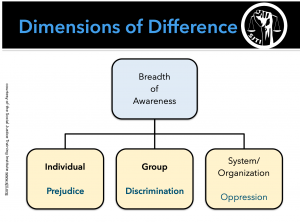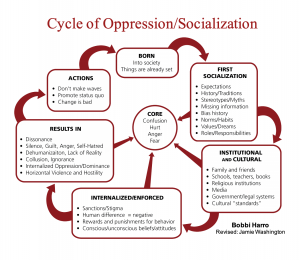Via Craig Elliott.
Tips for Creating Effective White Caucus Groups
Developed by (unless otherwise noted): Craig Elliott PhD craig@drcraigelliott.com 510-867-8231 www.drcraigelliott.com
Description and Purpose
White Caucuses are an important mechanism for people who identify as white and/or have white skin privilege to do our own work. It provides us an environment and intention to authentically and critically engage in whiteness, white privilege, and hold each other accountable for change. We explore how to recognize whiteness and white privilege, identify and interrupt our internalized dominance, and collectively develop strategies for liberation and change. Caucuses are our group-level work (building upon our individual self work) so that we individually and collectively can be effective partners for change. Pedagogical Approaches To be effective, we need to get our hands dirty. The solutions we generate depend a great deal on how we see the problem and we need to get out of the classroom. Whiteness often has us stuck in our heads and intellectualizing. Racism and oppression are lived experiences, and embodied. We cannot be effective in partnering for change if we stay in our heads; we need to be courageous to engage, be vulnerable, feel, and be imperfect. Only then can we partner with other whites and people of color.
Pre-Caucus Work
• It is important for caucus members to do their own self work exploring their relationship to whiteness, white privilege, dominance, systems of oppression and other intersectional areas of oppression.
• If the group is new, or if there are participants who have not done their individual group work, you will need to take time to prompt that self work.
• Related, the group must have some knowledge of “Dimensions of Difference” and “Cycle of Oppression and Socialization”
• Spend time identifying your intentions for meeting. This will help the group stay motivated toward liberation and healing rather than self-loathing and denial


Set Up (Thoughts to Consider)
• In the least, you will need to arrange for a time and place to meet. If you are meeting in person, this can be an actual place; if you are meeting virtually, this can be via technology.
• Consider meeting over a food if you are meeting in person. Communion is a powerful energy for connection, but it is not necessary, nor always possible.
• Know that the time you have is never long enough, but it is enough. Traction happens over the course of time, session by session. To quote Pema Chodron, start where you are.
• Invest in the process of building the community. Whiteness trains us to skip process and go right to outcomes, and to be individuals. Building community allows us to support each other, hold each other accountable, and understand that we are truly a group/team.
• Having motivated participants is very important. You will experience resistance as a part of this liberatory journey, and having this motivation to lean on when it gets difficult is important. To quote, Jamie Washington, resistance is a sign that you are in the right place.
• Remember that Whiteness has us remain in discussion structure, timeframes, and agendas rather than engaging in our embodied experiences with whiteness, white privilege, and internalized dominance. We also get stuck in the quest for perfection before we start. Have the courage to start.
• Over time, you will need to do less facilitating and structuring as a invested group will steer themselves
• Start with a check in
Sample Caucus Setup
Caucuses are a structure for like groups to build community, share feelings, engage in dialogue, and doing “like group” work. Race-based caucuses then allow a group to see the complexities in how race and racism manifest in our lives. It is an opportunity for Reflective Practice and Action.
For White groups, we often need to reflect, explore, and act around:
• Discovering whiteness and its meaning
• Discovering our internalized dominance
• Learning how we show up in our whiteness
• Seeing ourselves in each other
• Needing individual and collective healing
Commit to intended focus and purpose for the caucus, and allow for specific topic flexibility (allow it to ebb and flow). Also be transparent about purpose so that we can acknowledge the distrust that we have in discussing whiteness with other people.
A Note About Whiteness and Multiracial People
The US population is increasingly multiracial, yet we exist in a structure that operates mono-racially. Remember to recognize the complexities of race and know that multiracial people who are white as part of their racial identity or have white skin privilege will be exploring their racial experience on multiple levels. Providing fluidly to go to create multiple caucuses or have breakout time can be important.
Caucus Framing
Share the importance of caucus group and why is it necessary now. Acknowledge that it is also problematic because race is complex and that it is essential for our consciousness building and for our ability to be effective partners. Bringing our own reflections and own stories will help us to go deeper into the work Caucus Time Here sample flow for the White People Group:
• What thoughts or feelings do I have about meeting in caucus groups?
• How have I benefited from white privilege? How have I internalized white dominance?
• How can I move from colluding with a system or racism to taking responsibility for my role as an agent of racism? To taking action to end racism?
• What are the costs and benefits of becoming an ally to people of color and doing anti-racism work?
• How will we share our thoughts & experience with the large group? (Pay special attention to air time!)
• Caucus Debrief (Fishbowl)
Moving Toward Liberation developed by Tanya O. Williams, Ed.D.
Liberation is the creation of relationships, societies, communities, organizations and collective spaces characterized by equity, fairness, and the implementation of systems for the allocation of goods, services, benefits and rewards that support the full participation of each human and the promotion of their full humanness. (Love and Dejong, 2013)
Liberatory Consciousness is a way of living in a world characterized by oppressive systems with awareness and intentionality. It enables us to maintain an awareness of the dynamics of oppression without giving into despair and hopelessness and an awareness of the roles played by each individual in the maintenance of that system without blaming them for the roles they play. And it enables humans to live outside the patterns of thought and behavior learned through oppressive socialization process to support us in being intentional about our role in working toward transformation and the elimination of internalized dynamics (Love, 2003)
As your group develops and has significant time exploring and engaging white privilege and whiteness, they may be ready to explore how to dismantle our oppressive structure and help build one built upon liberation. Here are some additional prompts to use:
• Describe a memory of experiencing or witnessing someone mistreated because of they were a member of a subordinate racial identity group.
• What happened?
• What do you remember doing, saying?
• How did you feel?
• Did anyone interrupt the racism in this incident?
• What did they do to successfully interrupt the racism?
• If no one intervened to interrupt the racism, what do you wish that someone had done to interrupt the racism? What do you imagine that someone could have done to interrupt the racism?
• What is one thing that you wish that you would be able to do if that incident occurred again in the future?
Additional Resources
Authentic Dialogue With White Activists Developed by Dr. Craig Elliott 2016; adapted from Dr. Kathy Obear
In your small group share and relate to each other using any of the following prompts:
1. When are you at your best as a white activist?
2. What are some of your fears as you engage issues of social justice as a white activist?
3. What common dominant group behaviors and attitudes do you still notice within yourself as a white activist?
4. When and where do you get stuck? Not show up very effective or competent as a white activist? How do you feel when you are stuck and less effective?
5. What would feel supportive from other white activists? To help you continue to grow and develop skills?
6. When have you:
• Felt fear when interacting with people of color?
• Felt fear when interacting with whites?
• Felt guilt or shame as a white person?
• Felt anger towards people of color?
• Felt anger towards other whites?
7. What are 5+ ways you have personally benefitted from white privilege?
8. What are some examples of how you have intentionally used white privilege to help dismantle racism?
9. When have you used white privilege to gain an advantage for yourself? Greater access?
10. What racial stereotypes do you still find yourself believing, tripping over?
11. What are 3-5 examples (over the past 1-2 years) when you have reacted out of some of these racial stereotypes: either within a group of whites, or in a mixed race group, or with people of color?
12. Share an example of a time you spoke up and effectively engaged whites whose comments or behaviors were biased or misinformed: How did you feel? What did you do/say?
Read the rest of the guide here.
Via Craig Elliott.
